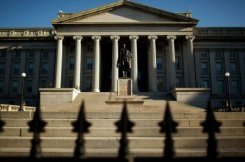 |
| The statue of the first US Secretary of Treasury, Alexander Hamilton, in front of the US Treasury Department © AFP/Getty Images/File Chip Somodevilla |
WASHINGTON (AFP) – US Treasury Secretary Timothy Geithner insisted the economy was strong and blasted an unprecedented credit downgrade as “terrible judgment” on Monday as he sought to reassure jittery investors rushing to sell US securities.
Geithner spoke in a television interview late Sunday as G7 central bankers and financial chiefs pledged to “take all necessary measures” to support financial stability and growth in the wake of a eurozone crisis and the US credit downgrade.
But Standard and Poor’s managing director warned of possible further downgrades if Washington fails to get its fiscal house in order.
“If the fiscal position of the United States deteriorates further, or if the political gridlock becomes more entrenched, then that could lead to (another) downgrade,” S&P ratings head John Chambers told ABC television.
The first day of trading following the downgrade saw Asian stocks tumble. Tokyo shed 2.18 percent, Seoul sank 3.82 percent, and Sydney fell 2.91 percent while Shanghai lost 3.79 percent.
Major European markets also opened with losses but sentiment picked up after the European Central Bank bought eurozone government bonds, taking the pressure off Italy and Spain.
Futures pointed to upcoming losses on Wall Street as well — just hours before trading was due to resume. Dow Jones Industrials futures were off 2.3 percent while broader S&P 500 futures shed 2.6 percent.
Standard and Poor’s stunned Americans Friday when it lowered the credit rating for US Treasures for the first time ever from a sterling AAA to AA+, pointing out deep divisions in Washington over its long-term fiscal standing.
“I think S&P has shown really terrible judgment and they’ve handled themselves poorly, and they have shown a stunning lack of knowledge about basic US fiscal budget math, and I think they came to exactly the wrong conclusion,” Geithner said.
Geithner used the interview with NBC News and CNBC to assure investors that the US economy remains strong and resilient despite the political battles in Washington, and that US Treasuries were as safe as ever.
“There is no risk the United States of America would ever not be in a position to meet its obligations,” he said.
A deal reached by Congress to cut some $2.5 trillion over 10 years in exchange for raising the congressionally-set debt ceiling fell short of the S&P’s call for the United States to cut $4 trillion over the same period.
US lawmakers, meanwhile, spent the day blaming each other for the credit downgrade, with some Republicans calling for Geithner’s resignation.
But the White House said Geithner would stay on at Treasury, ending speculation that he would leave after two-and-a-half years in the hot seat during a period that saw the US economy plunge into the worst recession since the Great Depression.
Former US Federal Reserve chairman Alan Greenspan, speaking earlier on NBC, said he believes the markets will react negatively to the downgrade and that it’s “going to take a while to bottom out.”
Greenspan, however, said that US Treasury bonds are still a solid investment.
Obama’s former top economic advisor Larry Summers, appearing on CNN’s “State of the Union,” attacked the S&P downgrade as an unwarranted piling on atop an already weak economy.
Summers said the country could pay its bills, and repeated the administration’s allegations that S&P’s decision to downgrade was linked to a $2 trillion accounting error and its use of a faulty baseline.
These assurance notwithstanding, China accused Western nations Monday of putting the global economic recovery at risk by “ignoring their responsibility.”.
The criticism in the People’s Daily — the mouthpiece of China’s Communist Party — was the latest in a series of harshly-worded articles in state media about the US and European debt crises.
Meanwhile, Democratic and Republican lawmakers continued the finger pointing Sunday over the downgrade debacle.
Democratic Senator John Kerry described it as a “Tea Party downgrade,” referring to the ultra-conservative anti-tax movement, and said a debt deal reached after weeks of heated negotiations fell short because some Republicans “were willing to shoot the hostage.”
“What we need is a Washington that stops this bickering,” Kerry told NBC’s “Meet the Press.”
Republican Senator John McCain, also appearing on NBC, blamed Obama, saying he had failed to put forth a specific debt plan.
“I agree that there is dysfunction in our system, but a lot of it has to do with the failure of the president to lead,” he said.
© AFP — Published at Activist Post with license
linkwithin_text=’Related Articles:’



Be the first to comment on "Fresh credit warnings as US lawmakers trade blame"